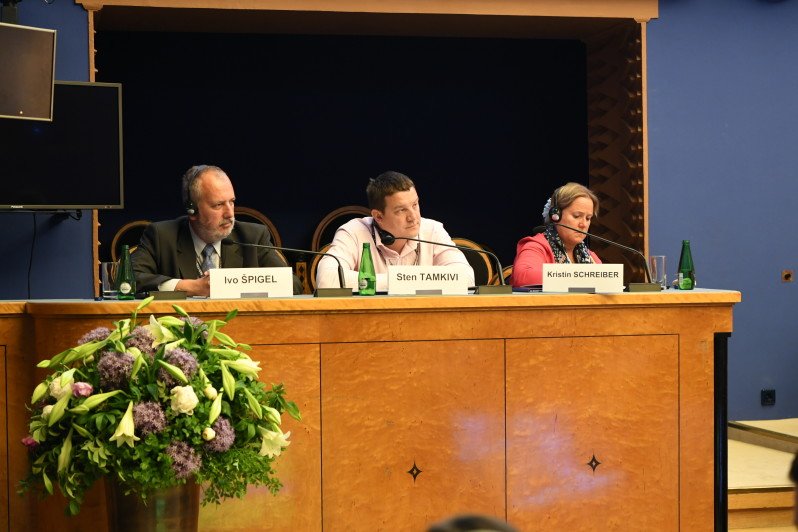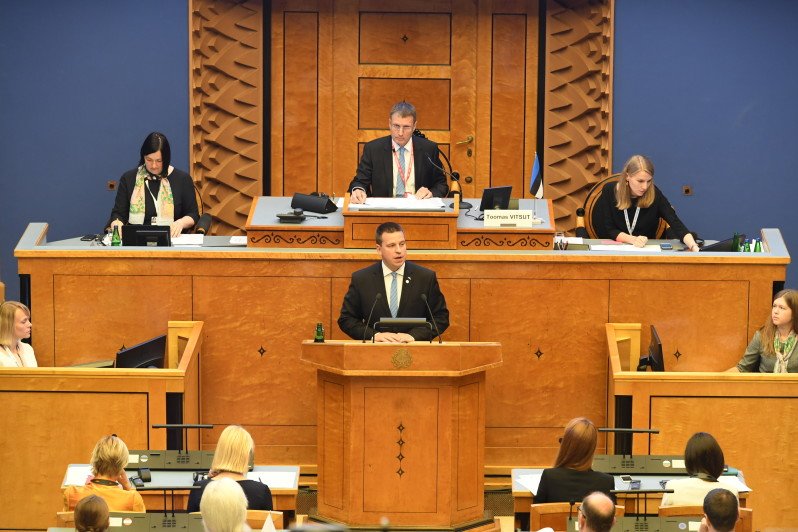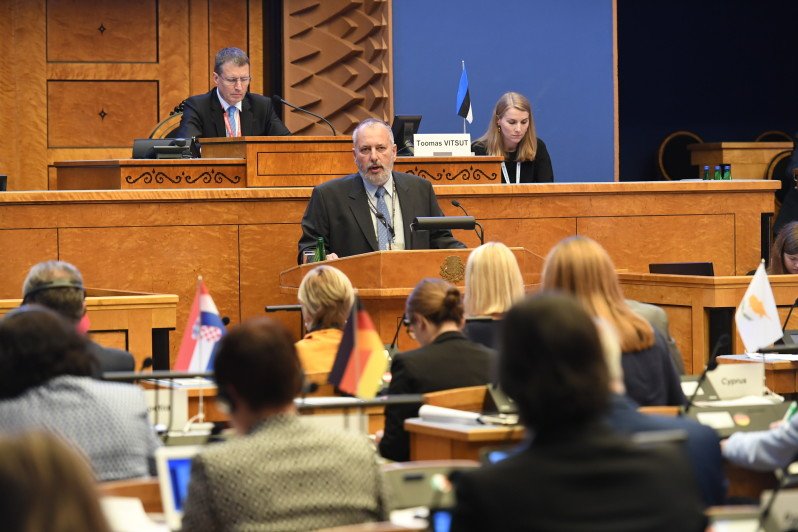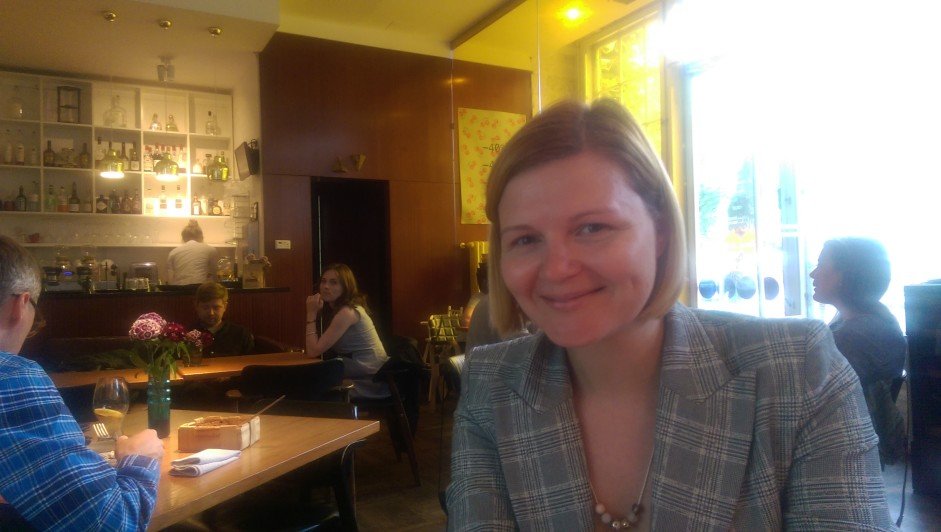It's been a few centuries since the heyday of the Hanseatic League. The powerful network of trading cities, guilds and merchants was formed in the 15th century and was a formidable force in European shipping and trade for many centuries afterwards.
At its eastern edge lay two cities from modern-day Estonia. Tallinn, the capital, was known as Reval at the time while Tartu, the university city, was called Dorpat.
The merchants, shipbuilders and pirates of the Middle Ages have long since passed into history and legend, but Estonia is busy writing today's and tomorrow's history.
I've recently had the honour of being invited to the Riigikogu – the Estonian parliament – to participate in a conference of parliamentarians of all the member states. The occasion was Estonia's Presidency of the Council of the European Union. As the presiding country, the Estonian parliament chose to focus, in this conference, on an open and innovative European economy, supporting the growth of startups. And so I found myself in the Great Hall of the parliament along with Ms Kristin Schreiber, Director of the COSME program and SME Policy at the European Comission, and Sten Tamkivi, a longtime Estonian friend who had been head honcho of Skype's 400+ strong engineering team in Tallinn when we first met some years ago.

Sten's next gig was founding and building Teleport, which was just recently acquired by London-based MOVE Guides, focused on helping companies relocate employees across geographies.
At the conference, Estonia's Prime Minister Jüri Ratas outlined the political priorities which the country would focus on during its half-year presidency. Not surprisingly, a „Digital Europe“ was high on the list, with a particular emphasis on the complex issue of „the free movement of data“.

To quote from PM Ratas' speech at the Riigikogu: „It will not come as a surprise that one of Estonia's priorities is a Digital Europe. We believe that Europe is ready for a common, modern, accessible and secure electronic environment where the risks are managed and the benefits are obvious. We will focus on the increased use of e-solutions and the free movement of data as well as the development of cross-border e-services and e-commerce.“
Ms Schreiber, Sten and myself spoke about the need to make it easier for European high-growth companies not only to get founded and get funded but also to grow and scale and do business all across Europe and globally. This was not a typical tech conference, so we weren't preaching to the choir.

In the Great Hall of the parliament were parliamentarians from all around the EU who have many different „normal“ topics on their plates every day and are not living in the tech / startup bubble like most of tech.eu's readers. I certainly hope we left them with at least a few things to think about and discuss with their colleagues back in their respective home countries.
Later that day I met Siim Siikut. The name may not ring a bell for most of you, but if I explain that Siim was one of the original founders of the Estonian e-residency program, and that he is the Government CIO today, I'm sure many readers will say „A-ha! That guy!“
The e-residency program got started in 2014. The program's stated aim is to have ten million Estonian e-residents by the year 2025. By the time of writing this article the number had surpassed twenty thousand. The very first e-resident, British journalist Edward Lucas, is very much a celebrity in the Estonian high-tech community. Just mention his name to a startup founder and they will say „Ah! Edward Lucas – our first e-resident!“
Siim and many others I met seem to be pleased - they feel the program is progressing well.

As of a few months ago, everything's in place so that you can – if you so desire – set up a company, open up a bank account (through a partnership with the Finnish online bank Holvi) and get down to business without ever traveling to Estonia itself (although I would definitely recommend a visit!).
Siim and I spoke about e-government and digital Europe as a high priority for Estonia during its half-year presidency of the Council of the European Union. Our chat took place on the 30th floor of my hotel, with a spectacular view of Tallinn harbor. It didn't hurt that it was a beautiful sunny day, one of – statistically – only 66 in the Estonian capital!
„Digital Europe is really a priority for us. It's not just something promoted by us geeks in government – it's strongly and publicly supported by the political leadership, including Prime Minister Jüri Ratas. A crucial aspect for our vision of Digital Europe is the free movement of data across borders", Siim said.
Data is indeed the critical resource of the XXI century, much like natural resources such as oil were driving the economy of the XXth century. Of course, there are numerous questions being asked, very legitimate and reasonable ones such as privacy and protection of data, ownership, even „inheritance“ – what happens to my Facebook posts after I pass away?“
I asked Siim which European partners are engaging most actively with his team on building solutions and answering the pending questions.
„There are differences between countries actively working on e-government topics, on one hand, and digital economy issues on the other. In the first group I could highlight the Nordic countries (especially Denmark and Finland), Netherlands, Austria, for example. Obviously our countries need to work on both of these broad topics if we want to bring the full benefits of Digital Europe to our citizens and businesses.“
My conversation with Mari Vavulski was at the „Sphere Resto & Store“ – about as hipsterish a combination of restaurant and „shabby chic“ shop as you could find in any of the „artists & geeks“ neighborhoods in Berlin, London, Boston or SF. Mari is on the „Startup Estonia“ team, figuring out which are the ways to make Estonia an even better place for local and international founders and teams to set up shop, start, grow and scale their businesses.
„We take great care not to interfere or compete with private initiatives“ she explained over a really nice lunch. „Startup Estonia, together with the SmartCap government fund-of-funds, is selecting early-stage private fund management teams into our portfolio – just last week we announced the first fund managed by Rain Rannu, Veljo Otsason and Marek Kiisa, serial entrepreneurs and active angels. They will combine public and private investors' capital to further boost the ecosystem.“

Aside from supplying capital on the „back end“, so to speak, some of Startup Estonia's other priorities include working on and reforming regulation for high-growth companies; marketing Estonian startups to the world and making sure it's as easy as possible for top international talent to come to Estonia to either start their own projects or join one of the numerous startups already active and growing.
„Startup Visa is a major effort for us,“ Mari posited. „We are reaching out to large countries with young, tech-savvy populations such as Ukraine, Turkey and India.“ So ... if any of you readers out there are working for a government other than the Estonian one – take note. The Estonian government is actively supporting local companies in recruiting the talented boys and girls from the famous Indian Institutes of Technology!
In the next article of this two-part series on the Estonian tech scene, I will be sharing my conversations with the private sector side – entrepreneurs, founders, co-working spaces, accelerators and other key players in the ecosystem.
Parliament conference photos courtesy of Riigikogu - the Estonian Parliament. More can be found here. Other photos: Ivo Spigel



Would you like to write the first comment?
Login to post comments